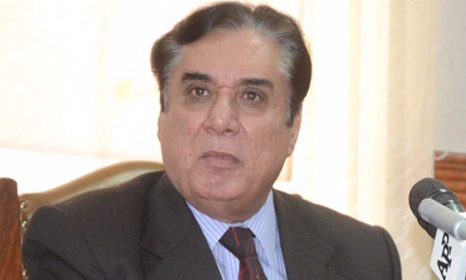ISLAMABAD: The Supreme Court on Friday expressed dissatisfaction over what it described as failure of the judiciary and all other institutions to hold corrupt elements accountable and sought a thorough investigation report on issues of petrol pricing and taxation, appointments in the Pakistan State Oil (PSO) and Liquefied Natural Gas (LNG) import deal.
“The accused persons get favourable decisions from courts due to negligence of the National Accountability Bureau (NAB),” Chief Justice of Pakistan Saqib Nisar remarked during the hearing of a suo motu case on exorbitant taxes, cess and duty on petroleum products when the bureau sought three weeks to inquire into the matter.
“We cannot give you weeks. It is a matter of days,” CJP Nisar said before giving 12 days to NAB for proper investigation. However, he warned NAB of consequences in case its investigation officer left any loophole in the probe.
SC seeks report on petrol pricing, LNG import deal
“It is the defective investigation that leaves courts with no option but to exonerate the accused person,” the CJP said, adding that the court had to pay the price for NAB’s negligence since the judiciary came under criticism for acquitting the accused persons.
He noted that by filing excessive references NAB showed ‘fake progress’ which damaged reputation of notable persons sometimes when it failed to prove the allegations. “There is no compulsion for NAB to file a reference over each and every inquiry. They can clear an accused if there is insufficient evidence,” he said.
The CJP also remarked that the director general of NAB in Sindh was facing a case.
While appearing before the court, federal Minister for Petroleum Ghulam Sarwar Khan earlier assured the court that the government was there to provide relief to citizens and to resolve all these issues, and that he had formed a task force.
The apex court suggested to the minister to get help from an audit report, as it would help the petroleum ministry to effectively handle the issues.
The chief justice reminded Mr Khan that the utmost responsibility of the judiciary was protection of fundamental rights. He said unnecessary expenditure and spending by the Pakistan State Oil (PSO) put unnecessary burden on the end consumer.
CJP Nisar disclosed during the proceedings that the PSO managing director received Rs3.7million salary every month and when he asked the MD about his job description, it appeared “his role was not more than that of a coordinator”.
While briefing the apex court on petroleum prices, chartered accountant Mukhtar Kazmi said the PSO was abiding by the Public Procurement Regulatory Authority (PPRA) rules. The import price of petrol was Rs61 on which Rs1.32 charges, including insurance, were applied, he explained.
According to him, Rs10.17 is the domestic cost per litre which includes Rs3 freight charges to ensure uniformity in petrol prices across the country while Rs3.47 is the dealer commission that is determined by the government. Besides, a sum of Rs27 is paid in taxes including a fixed Customs Duty and General Sales Tax (GST), which is determined by the Federal Board of Revenue.
When the CJP asked how the government determines tax rates, Attorney General Anwar Mansoor Khan said: “The Oil and Gas Regulatory Authority gives recommendations which are then approved by the federal cabinet.”
However, the apex court observed that excessive salaries, pricing issues and dealership grants were the reasons for exorbitant rates of the petroleum products. “If PSO does not determine the prices, why the former MD had been getting a salary of Rs3.7 million?” CJP Nisar asked.
He then directed NAB to investigate whether or not top appointments in the PSO were made in a transparent manner.
“We would also like to know whether the deal to import the LNG was transparent or not,” the CJP remarked. The petroleum minister informed the court that prima facie the deal was not transparent, since some clauses of the agreement had been kept secret.
The attorney general assured the court that a report in this regard would be submitted within a week.
The court later adjourned the hearing till Oct 10.
Published in Dawn, September 29th, 2018















































